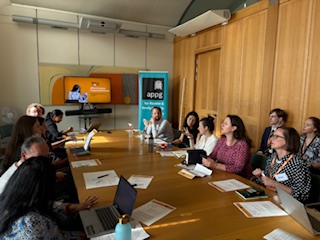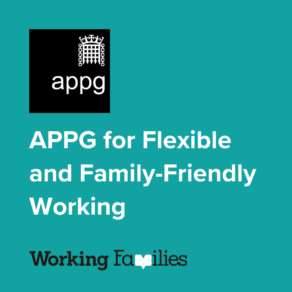New research uncovers the economic and social benefits of improving paternity leave
Published: 10 Jul 2025

Parliamentarians from across the parties came together to hear new research from academics that have been assessing the cost benefits of improved statutory paternity leave and the need for better statutory provision for small and medium sized businesses (SMEs).
At the second meeting of the APPG for Family Friendly and Flexible Working, sponsored by TLT LLP, Wates and Zurich and partnered with Nottingham University Business School, the University of Bath presented the findings from a new research project that carried out a cost-benefit analysis of extending statutory paternity leave to six weeks at 90% of (capped) earnings, that would match the current offering to women. They found this reform could generate over £12 billion in net social benefits annually. As well as representing significantly better value for money than the current Shared Parental Leave scheme the study found improvements in family wellbeing and enhanced maternal employment, a catalyst for reducing the gender pay gap.
The University of Middlesex, as part of a wider ESRC-funded collaboration with the Universities of Leeds and Manchester, explored the transition to parenthood for people working in SMEs, which employ over 52% of the UK workforce. Their research found gaps in awareness and access to statutory leave, and the support available to employers.
The vast majority of 2000 SME employers surveyed, overestimated (over 90%) the amount of statutory paid parental a mother could take, and underestimated (over 80%) that available to a father or non-birthing parent. In particular, both awareness and take-up of the Small Employers’ Relief scheme are low, with only 10% of SME employers have claimed from the relief scheme. 43% of SME employers do not know about it and a fifth know about the scheme but have never claimed it. Among claimants, 72% of SME employers report it was helpful, while 28% feel it was not worth the administrative effort.
Given that 41% of SME employers would consider a female candidate’s future childcare commitments in their recruitment decisions, it is clear that is a strengthened statutory offering for fathers and non-birthing parents, alongside more effective communication to SMEs from policymakers, could significantly reduce sex discrimination as well as better support fathers and new families.
- New paternity leave plan could deliver £12bn+ in annual social benefits
- Proposal: 6 weeks’ leave at 90% pay – same as current maternity offer
- Better value than Shared Parental Leave, says University of Bath
- Boosts family wellbeing and maternal employment
- Transition to Parenthood research finds 91% of SME employers overestimate the length of paid maternity leave
- 41% say they would consider a female candidate’s future childcare commitments in their recruitment decisions
- Yet only 10% of SMEs claim Small Employer Relief
- A stronger statutory offer and better SME engagement would support fathers and reduce sex discrimination.
- Findings presented to cross-party MPs in Westminster
The discussion centred on how paternity leave can and should be used to shift family and workplace norms, with patterns of care being set early in a child’s life, and how to raise awareness amongst SMEs and simplify the system.
Sarah Russell, MP for Congleton and co-chair of the APPG said:
Improving parental leave is not just about fathers, it’s about healthier families, more balanced workplaces and an inclusive society. We have a chance to reshape what modern parenthood looks like with the upcoming parental review. Reforming and investing in parental leave isn’t just timely—it’s transformative, with ripple effects across generations.
Baroness Penn, co-chair of the APPG said:
This research shows the huge potential benefits of giving fathers and second parents access to a decent, well paid period of paternity leave. It also shows that it is essential that the government takes proper account of the needs of small and medium businesses when conducting their review of parental leave and make any reforms to the system easier to navigate and use.
The government have given themselves a long time to conduct this review, that time needs to be well spent so it results in a clear roadmap for reform with enhanced pay and leave for fathers as a core part of that.
Jane van Zyl, CEO, Working Families said:
The evidence for improving parental leave has never been clearer. Surely, it’s time we move beyond decent, funded paternity leave being a perk afforded to some, and instead treat it as one of the key pieces of the puzzle in creating a fairer, more equal and healthier society where everyone reaps the rewards.

APPG for Flexible & Family Friendly Working
Bringing together cross-party support for flexible working, so that everyone can enjoy the benefits, including families, employers, and the economy.